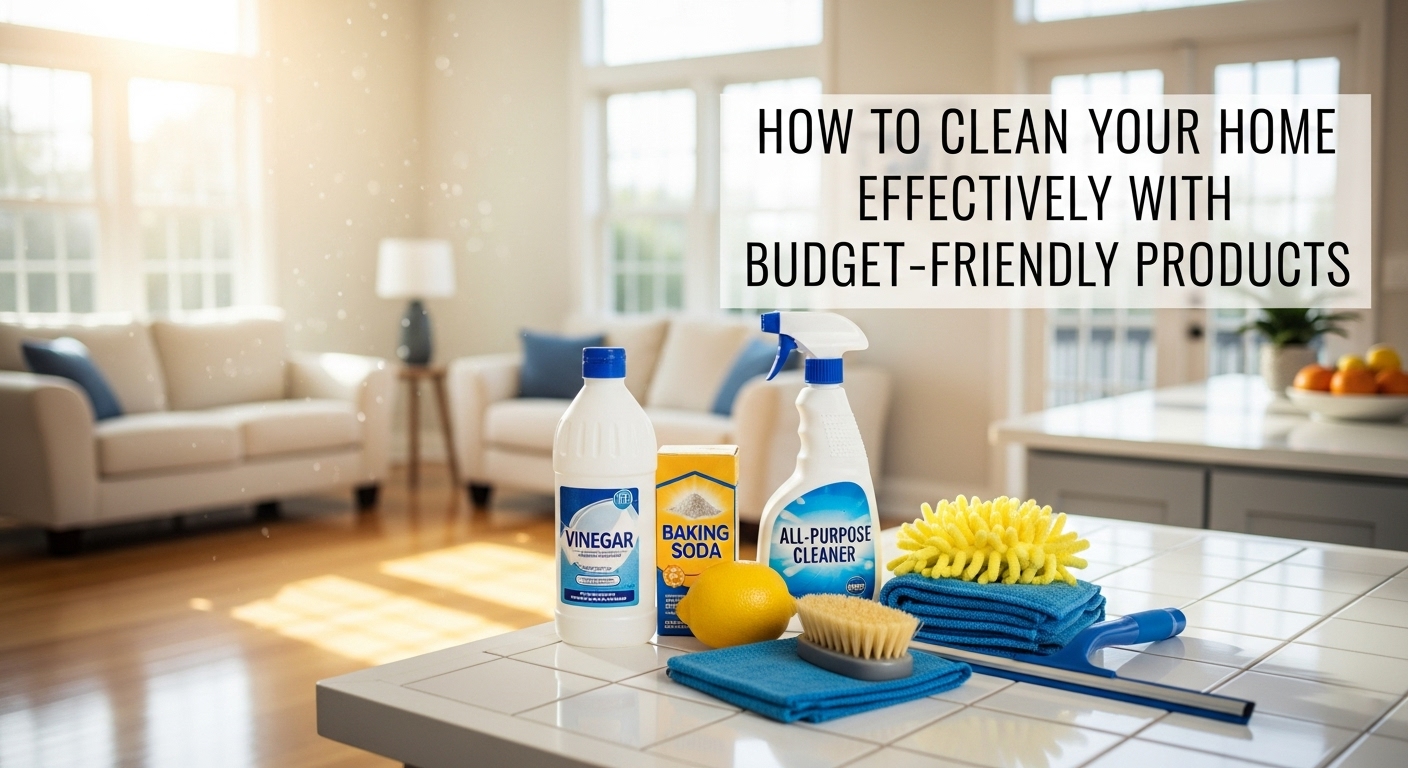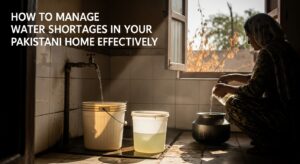Keeping a home clean and tidy is a never-ending task, and sometimes, the cost of cleaning products can feel like a burden. In Pakistan, where every rupee counts, finding ways to maintain a spotless home without breaking the bank is a smart move. This guide is your ultimate resource for achieving a sparkling clean house using readily available, budget-friendly products and clever techniques that are perfect for Pakistani households.
We’ll walk you through everything, from daily routines to tackling stubborn dirt, all while being mindful of your wallet.
Understanding Your Cleaning Needs
Before you dive into cleaning, it’s helpful to understand what your home truly needs. This isn’t just about saving money; it’s about being efficient and effective.
Take a tour of your house. Look at different surfaces – floors, kitchen counters, bathroom tiles, windows – and identify common issues like dust, grease, soap scum, or hard water stains. Note down areas that get the most traffic and dirt.
Walk through each room with a pen and paper. For example, in the kitchen, you might note “greasy stove,” “stained sink,” or “dusty shelves.” In the bathroom, it could be “limescale on taps” or “mildew in shower corners.” This quick assessment will be your starting point.
The Power of Basic Ingredients: Your DIY Cleaning Toolkit
You’d be surprised how many powerful cleaning solutions you can make at home with ingredients commonly found in Pakistani kitchens and stores. These are not only affordable but often safer for your family and the environment.
Focus on acquiring a few versatile items: white vinegar, baking soda (sodium bicarbonate), lemon juice, rock salt, and good quality dish soap. These humble ingredients are superstars in their own right.
You can buy these in bulk from local grocery stores or kiryana shops, which is usually more economical. Look for larger packs of baking soda and vinegar. Dish soap is also widely available and can be used for more than just dishes.
Crafting Your Own Cleaning Solutions
Once you have your basic ingredients, it’s time to become your own cleaning product chemist! These homemade recipes are simple, effective, and budget-friendly.
All-Purpose Cleaner for Everyday Use
Combine equal parts white vinegar and water in a spray bottle. You can add a few drops of essential oil like lemon or orange if you like a fragrance, though it’s not necessary for cleaning.
Spray the surface liberally, let it sit for a minute or two (especially on tougher spots), and then wipe clean with a microfiber cloth. For streak-free results on glass, follow up with a dry cloth or newspaper. Avoid using this on natural stone surfaces like marble or granite regularly, as vinegar’s acidity can etch them over time.
Baking Soda Paste for Tough Stains and Scrubs
Mix baking soda with just enough water to form a thick paste. You can also add a squeeze of lemon juice for extra cleaning power and a fresh scent.
Baking soda is a mild abrasive that can scrub away stubborn dirt, grease, and food residue without scratching surfaces. It also neutralizes odors, making it ideal for sinks, stovetops, and even the inside of your refrigerator.
Apply the paste directly to the stain or surface. Let it sit for 5-10 minutes. Then, scrub with a brush or sponge. Rinse thoroughly with water. This works wonders on greasy stovetops, dirty sinks, and grimy tile grout.
Lemon and Salt Scrub for Kitchen Sinks and Faucets
Cut a lemon in half. Sprinkle a generous amount of rock salt or regular table salt onto the cut surface of the lemon.
Lemon juice provides natural acidity and bleaching properties, while the salt acts as an abrasive. This combination is fantastic for cleaning and shining stainless steel sinks and chrome faucets, removing water spots and light rust.
Use the lemon half as a scrubbing tool, rubbing it vigorously over your sink and faucets. The salt will help scour away grime. Rinse thoroughly with warm water afterwards to reveal a sparkling finish.
White Vinegar for Bathroom Brilliance
For toilets, pour a cup or two of undiluted white vinegar into the bowl, especially around the rim. For showerheads and taps with limescale, soak a cloth in vinegar and wrap it around the fixture, securing it with a rubber band.
Vinegar is highly effective at dissolving mineral deposits (limescale) and hard water stains, which are common in Pakistani bathrooms due to water quality. It also disinfects and removes unpleasant odors.
For toilets, let the vinegar sit for at least 30 minutes, or even overnight, before scrubbing with a toilet brush and flushing. For showerheads and taps, let the vinegar-soaked cloth sit for a few hours or overnight, then remove and scrub gently with an old toothbrush. Rinse well. You’ll be amazed at the shine.
Essential Cleaning Tools on a Budget
Having the right tools makes a big difference, but you don’t need expensive gadgets. Smart choices can keep your cleaning arsenal affordable.
Focus on good quality microfiber cloths, old toothbrushes, a sturdy broom, a dependable mop, and buckets. A squeegee for windows and shower screens is also a great, inexpensive addition.
Good basic tools last longer and make cleaning more effective. Microfiber cloths, for instance, pick up dust and grime better than traditional cloths, reducing the need for excessive product. Old toothbrushes are perfect for tight corners and grout lines.
You can find affordable and durable cleaning tools at local hardware stores (hardware ki dukaan) or general stores (general store) across Pakistan. Don’t throw away old t-shirts or towels; cut them into usable rags. Reuse old spray bottles from finished cleaning products.
A Practical Cleaning Schedule for Pakistani Homes
Consistency is key to a clean home, and a routine helps prevent dirt from building up, making deep cleaning less frequent and easier.
Daily Cleaning Habits (Rozana Safai)
Make your bed – Instantly makes the room look tidier.
Wipe kitchen counters – Do it after every meal to prevent food from drying and sticking.
Wash dishes immediately – Avoid sink pile-ups and stubborn stains.
Sweep kitchen floor – A quick sweep removes crumbs and spills.
Clear clutter – Return items to their place as soon as you’re done using them.
These small daily tasks prevent mess from accumulating, making larger cleaning sessions less daunting. A clean kitchen after cooking and a tidy bedroom promote a sense of calm.
Make these habits second nature. As soon as you finish cooking, wipe down surfaces. Before leaving a room, quickly put things away. It takes only a few minutes but saves hours later.
Weekly Cleaning Tasks (Haftawari Safai)
Bathrooms – Clean toilets, sinks, mirrors, and wipe down showers.
Kitchen – Mop floors, wipe down appliance exteriors, and clean the stovetop thoroughly.
Dusting – Dust all surfaces, furniture, and electronics in living areas and bedrooms.
Floors – Vacuum carpets or sweep and mop hard floors throughout the house.
Weekly cleaning addresses areas that accumulate dirt quickly. Regular cleaning prevents mold, mildew, and grime from setting in, which are much harder to remove later.
Dedicate a specific day or time each week for these tasks. For example, “Friday is cleaning day.” You can divide tasks among family members to share the load.
Monthly and Seasonal Deep Cleaning (Gehri Safai)
Windows – Clean inside and out.
Curtains/Blinds – Wash or dust.
Fan Blades & Light Fixtures – Wipe down and dust.
Appliance Deep Clean – Clean inside the oven, refrigerator, and microwave.
Cabinet Wipe Down – Empty and wipe down kitchen and bathroom cabinets.
Walls – Spot clean where necessary.
Deep cleaning addresses areas that aren’t cleaned regularly but can harbor dust and grime. It improves air quality, prevents damage to appliances, and ensures a truly clean home environment.
Deep cleaning can be spread over several weekends or tackled room by room. For instance, dedicate one weekend to the kitchen and another to bedrooms. Get the whole family involved for bigger tasks.
Common Cleaning Challenges in Pakistani Homes and Budget Solutions
Pakistani homes often face specific cleaning challenges, from dust accumulation to hard water stains. Here’s how to tackle them affordably.
Dust Management
Instead of feather dusters that just move dust around, use slightly damp microfiber cloths. For electronics, use a dry microfiber cloth or an old sock over your hand.
Damp cloths trap dust rather than scattering it, ensuring it’s removed from surfaces. Dust is a constant battle in Pakistan, especially in cities, so effective removal is key.
Always dust from the highest points downwards (e.g., ceiling fans, shelves, then furniture) so that falling dust lands on surfaces yet to be cleaned, eventually reaching the floor to be swept or vacuumed.
Hard Water Stains on Taps and Tiles
As mentioned earlier, white vinegar or lemon juice are your best friends here. For severe stains, create a paste of baking soda and vinegar/lemon juice.
The acidity breaks down the mineral deposits left by hard water, restoring the shine to your fixtures and tiles.
For taps, soak a cloth in vinegar and wrap it around the affected area for a few hours. For tiles, spray liberally with vinegar or apply the paste, let it sit, then scrub with a stiff brush. Repeat as needed for very stubborn stains.
Greasy Kitchen Surfaces
For general grease, a strong solution of dish soap and hot water works wonders. For baked-on grease, use the baking soda paste.
Dish soap is designed to break down grease, and hot water helps to loosen it. Baking soda’s abrasive quality provides extra scrubbing power for tough spots.
Apply the soap solution or baking soda paste. Let it sit for a few minutes. Use a non-scratch scrub pad or even an old credit card to gently scrape off hardened grease before wiping clean.
Tackling Cobwebs (Jalay)
Wrap an old cloth or sock around the bristles of your broom and secure it with a rubber band.
This simple tool allows you to reach ceilings and high corners easily, and the cloth traps the cobwebs instead of just pushing them around.
Lightly sweep the cloth-covered broom across ceilings and walls to gather cobwebs. Once done, remove the cloth, shake out the webs outside, and wash it.
Tips for Maintaining a Clean Home on a Budget
Beyond the actual cleaning, a few habits can significantly reduce your cleaning burden and costs.
Declutter Regularly
Go through your belongings regularly and get rid of anything you don’t use, need, or love. Donate, sell, or discard items that are just taking up space.
Less clutter means fewer surfaces to dust, fewer items to move when cleaning, and more open space. It makes your home feel cleaner and larger, and simplifies the entire cleaning process.
If you haven’t used an item in a year, chances are you don’t need it. Be ruthless but practical. Start with one drawer or one shelf at a time to avoid feeling overwhelmed.
Clean As You Go
Spilled something? Wipe it immediately. Finished eating? Wash your plate. Changed clothes? Put dirty ones in the laundry basket.
Fresh spills are much easier to clean than dried-on messes. Immediate action saves time and effort later, preventing stubborn stains and reducing the need for harsh cleaners.
Make it a conscious effort for a few weeks, and it will become a natural habit. Encourage family members to do the same.
Proper Storage
Invest in affordable storage boxes, baskets, or shelves to keep things organized and off surfaces.
When everything has a designated place, it’s easier to put things away, reducing clutter. Surfaces remain clear, simplifying dusting and wiping.
Local bazaars and superstores often have very affordable plastic containers, fabric baskets, and basic shelving units that can help you organize effectively without spending a lot.
Ventilation
Whenever possible, open windows and doors, especially when cleaning or after cooking/showering.
Good ventilation helps air out your home, removing stale odors and reducing humidity, which can prevent mold and mildew growth, especially in bathrooms and kitchens. It’s a simple, free way to keep your home fresh.
Open windows on opposite sides of the room or house to create a cross-breeze. Do this daily, even for a short while, to circulate fresh air.
Important Safety Considerations
While homemade cleaners are generally safer than commercial products, it’s still important to be mindful of safety.
General Precautions
Always ensure good airflow when cleaning, especially if using vinegar or any commercial product.
Ventilation prevents the build-up of strong odors and potential fumes, which can be irritating to your respiratory system.
Simple as that. If possible, use exhaust fans in kitchens and bathrooms.
Mixing Chemicals (Even Natural Ones)
This is a critical rule: never mix white vinegar with bleach (or any product containing bleach).
Mixing vinegar and bleach creates chlorine gas, which is highly toxic and can cause severe respiratory problems or even be fatal. Always err on the side of caution.
If you’re using bleach for a specific purpose, rinse the area thoroughly with water before or after using a vinegar-based cleaner. It’s best to stick to one type of cleaner per cleaning session for a given area.
Patch Testing
Before applying a new homemade solution to a large surface, test it on a small, hidden spot first.
While the natural ingredients are generally safe, different surfaces can react differently. This prevents discoloration or damage to your valuable belongings.
Apply a tiny amount of your solution to a corner or underside of the surface, let it sit for a few minutes, then wipe and observe for any adverse reactions.
Conclusion
Keeping your home effectively clean in Pakistan, even on a tight budget, is entirely achievable. By embracing basic, readily available ingredients, learning simple DIY recipes, and adopting consistent cleaning habits, you can maintain a sparkling clean and healthy living space without spending a fortune. Remember, a clean home is not just about aesthetics; it’s about creating a comfortable, hygienic, and peaceful environment for you and your family. Start small, be consistent, and enjoy the satisfaction of a clean home that’s been cared for with smart, budget-friendly choices.
Resources
- White Vinegar (Sirka) – Commonly found in general stores or supermarkets.
- Baking Soda (Meetha Soda) – Available at grocery stores and supermarkets.
- Lemons – Fresh and widely available in local fruit and vegetable markets (sabzi mandi).
- Rock Salt (Lahori Namak) / Table Salt – Easily found in all food stores.
- Dish Soap – Any local brand of liquid or bar detergent.
- Microfiber Cloths – Available at general stores, hardware shops, and larger supermarkets.
- Spray Bottles – Reusable spray containers found in hardware or general merchandise stores.
- Brooms, Mops, Buckets – Readily available at hardware shops (hardware ki dukaan) and local markets.
- Old Toothbrushes, Socks, T-shirts – Reuse items you already have at home.







